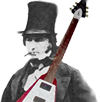Code of Practice
The Code of Practice for professional music education practitioners was created by MusicLeader & Soundsense
As a music practitioner I strive to:
-
Be well prepared and organised
I can show that I have the specialist knowledge, skills and attitudes I need to work effectively, and that I am committed to filling any gaps / I agree with contractors the reasons for the work to be done, and the desired outcomes/ I know enough about the setting I’m working in and its participants to ensure the success of the activity I turn up in time for work (or if I can’t I let someone in charge know in good time) /My appearance and behaviour are appropriate I keep in good communication with contractors and settings/ I keep up to date with all relevant paperwork, such as course planning documents, hand-outs, evaluation forms, invoices and budgets
-
Be safe and responsible
I am committed to ensuring the safety of children and vulnerable adults in my care / I ensure I have a relevant CRB disclosure if appropriate / I ensure that the activity is adequately protected by insurance / I ensure that risk assessments are carried out on my sessions; and I manage risks accordingly / I agree with contractors and settings on policies and processes for appropriate behaviour and equal opportunities / I can show purchasers references for my work / I charge appropriately for my services, to reflect the extent and quality of the work that I do, and the continuing professional development I undertake / I am clear and realistic about the extent of my skills in relation to the work I’m doing
-
Prepare for and reflect on my work
I discuss with contractors and settings the work to be done, and agree its aims and its delivery / I know how I will be able to provide quality, appropriate, music making experiences for the participants in each session / I am clear about the support I will need from my contractors and settings; and I ensure this support is available / I negotiate with my contractors and settings what monitoring data I need to collect, and I do so accurately and completely / I reflect on my sessions after I have carried them out, learning lessons for improved performance in the future
-
Have appropriate musical skills
I have an appropriate range of musical skills for the participants, settings and sessions I offer to work in / I have sufficient expertise on my instrument or discipline (unless the context clearly doesn’t require them) / I can demonstrate musical flexibility, versatility, creativity and improvisation ability / I have appropriate musical resources to be able to adapt and react to changing circumstances during work
-
Work well with people
I value my participants and treat them with respect / I am empathetic and sensitive to both group and individual dynamics / I can motivate and inspire my participants / I lead high quality, enjoyable, worthwhile music experiences with my participants / I am friendly, approachable and professional in my manner
-
Be committed to my own professional development
I can show that I am committed to improving and updating my skills, knowledge and creativity through, for example, active membership of Sound Sense and/or MusicLeader; attendance on courses; my professional portfolio

